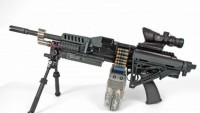U.S. Army Gearing to Fight More Lethal Wars against China and Russia
| Arthur Dominic Villasanta | | Oct 04, 2016 08:41 AM EDT |
(Photo : US Army) Bradley IFV and U.S. infantry.
The U.S. Army continues to transition from a force excelling in counter-insurgency to one that will win the deadlier conventional wars of the near future against China and Russia, said the U.S. Army's top general.
Gen. Mark Milley, U.S. Army Chief of Staff, said the army is being redesigned with new equipment and new doctrines to combat modern militaries such as those in Russia, China, North Korea and Iran.
Like Us on Facebook
This, because Gen. Milley foresees a future battlefield that "is going to be intensely lethal, the likes of which the United States Army, the United States military, has not experienced ... since World War II."
He also noted the world's militaries are on the verge of a fundamental change in the character of ground warfare. This "revolution" is perhaps five to 10 years away and will involve infantry, armor and mechanized divisions with the firepower of 20th century armies but that will operate more independently.
Army divisions in 2030 will require the ability to fight in multiple domains to win. Gen. Milley pointed out that some foes will match or exceed the United States in cyber capabilities and the ability to deny air supremacy.
Army divisions in 2030 must, therefore, have the ability to fight in the cyber domain. It must also be capable of defending itself against the air, missile and unmanned aerial system threats.
And to win, the army's future divisions must provide their commanders with land-based maneuver and fires forces that can deliver fires on time and on target. He said the army must combine capabilities across domains to prevent its enemies from successfully employing his tactics and technologies.
Gen. Milley cautions future conventional war won't be World War II reprised with higher tech. Instead, long-range precision weapons will blast big, obvious targets like command headquarters.
The prevalence of smart weapons will force both sides to organizer smaller combat units moving independently with no semblance of a front line.
Electronic warfare, jamming, hacking and cyber warfare will disrupt communications among these scattered units, forcing junior commanders to take the initiative as never before.
As a consequence of the more frenetic future battlefield, the army has to radically overhaul its equipment, training and culture to prevail against near-peer foes like Russia and China.
TagsU.S. Army, conventional war, Gen. Mark Milley, U.S. Army Chief of Staff, china, Russia, 2030
©2015 Chinatopix All rights reserved. Do not reproduce without permission
 Destroying China’s Militarized Islands will take about 15 Minutes, says Former US Spy Chief
Destroying China’s Militarized Islands will take about 15 Minutes, says Former US Spy Chief US to Sharpen Military Edge in Asia; Duterte Planning to Turn the Philippines Communist?
US to Sharpen Military Edge in Asia; Duterte Planning to Turn the Philippines Communist? US Navy SM-6 Achieves Longest Naval SAM Kill in History
US Navy SM-6 Achieves Longest Naval SAM Kill in History Planned US Infantry Rifle Fires ‘Telescoped’ Bullets 3X Deadlier than 5.56 mm
Planned US Infantry Rifle Fires ‘Telescoped’ Bullets 3X Deadlier than 5.56 mm
EDITOR'S PICKS
-

Did the Trump administration just announce plans for a trade war with ‘hostile’ China and Russia?
-

US Senate passes Taiwan travel bill slammed by China
-

As Yan Sihong’s family grieves, here are other Chinese students who went missing abroad. Some have never been found
-

Beijing blasts Western critics who ‘smear China’ with the term sharp power
-

China Envoy Seeks to Defuse Tensions With U.S. as a Trade War Brews
-

Singapore's Deputy PM Provides Bitcoin Vote of Confidence Amid China's Blanket Bans
-

China warns investors over risks in overseas virtual currency trading
-

Chinese government most trustworthy: survey
-

Kashima Antlers On Course For Back-To-Back Titles
MOST POPULAR
LATEST NEWS
Zhou Yongkang: China's Former Security Chief Sentenced to Life in Prison

China's former Chief of the Ministry of Public Security, Zhou Yongkang, has been given a life sentence after he was found guilty of abusing his office, bribery and deliberately ... Full Article
TRENDING STORY

China Pork Prices Expected to Stabilize As The Supplies Recover

Elephone P9000 Smartphone is now on Sale on Amazon India

There's a Big Chance Cliffhangers Won't Still Be Resolved When Grey's Anatomy Season 13 Returns

Supreme Court Ruled on Samsung vs Apple Dispute for Patent Infringement

Microsoft Surface Pro 5 Rumors and Release Date: What is the Latest?










